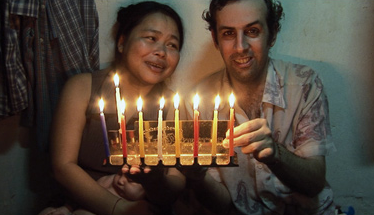Phnom Penh Lullaby
Phnom Penh Lullaby is a John Cassavetes-style documentary—about a bickering couple, no less—but one will not find amusingly rambling scenes of middle-class drunkards quaintly skirting their troubles. Here, the handheld, jerky camera lingers on sad babies, sad prostitutes, trash-strewn streets and some of the saddest domestic squabbles ever recorded on film. Depending on your personal taste, you will either be riveted or exhausted—even bored—by director Pawel Kloc’s insistence on following every rancid argument between the doomed central couple to its unreconciled end.
Ilan Schickman—who, with his five o’clock shadow, unkempt curly hair and clownish grin, bears a striking resemblance to Sacha Baron Cohen—is an Israeli expat making a ramshackle living as a tarot card reader in Cambodia. Aside from some voice-overs about his father’s death, which still haunts him, and his struggles to find employment in Israel, very little is mentioned about why Ilan fled for Cambodia.
Phnom Penh Lullaby is predominantly about Ilan’s involvement with Saran, a former prostitute, and her two baby daughters. Though Ilan has fathered the youngest daughter, six-month-old Jasmine, he refuses to marry Saran, wary of her continuing bouts with alcoholism and her haphazard attention towards their daughter’s various illnesses. He’s also too financially unstable to adopt the two-year-old child, Marie, whom Saran had with another, now-estranged john and who is seen being shuttled back and forth between Saran and Ilan’s squalid apartment and her slightly wealthier relatives in the countryside (it is revealed that Saran had several other children in the past, some of whom died and some of whom were adopted by Canadians).
The film is impressively objective about Saran and Ilan’s plight. Despite his horniness around some of Phnom Penh’s slinkier prostitutes, Ilan is shown to be a relatively moral guy, a caring father towards Jasmine, and steadfast about getting her vaccinations and about not subjecting her to sordid street life. (There are horrifying, grainy black-and-white interviews with pimps dryly describing prices for ten-year-old girls, and a heartbreaking scene in which Jasmine is almost sold off.) Saran is usually ill-tempered and foul-mouthed, threatening to stab Ilan and hire thugs to kill him when she doesn’t get her way; the naked, probing scenes of her bad judgment are infuriating to watch. But there’s a soft, sympathetic side to her, too, as well as a sense of reason; the audience will likely nod in agreement when she applauds Ilan for his gentleness—something her earlier lovers lacked—but condemns him for not finding a steady enough career to support the daughters he claims to love.
Kloc has chosen to subtitle Ilan’s broken English in perfect grammar, while Saran’s is transcribed phonetically (“You boom-boom me, no pay, why no marry,” is one of her typical attacks on Ilan for his lack of commitment). This becomes cloying after awhile, but at least early on it provides this otherwise punishingly bleak film with some humor.
Though Phnom Penh Lullaby is overbearing and finally off-putting—several scenes are emptily gratuitous, such as one that juxtaposes Ilan’s praying with shots of Cambodian poverty—Kloc should be commended for retaining a genuine fly-on-the-wall approach to the material. Throughout, he comes off like that rare urban eavesdropper, bold enough to gawk at a loudly public brawl within spitting distance of its combatants.
news via inbox
Nulla turp dis cursus. Integer liberos euismod pretium faucibua


